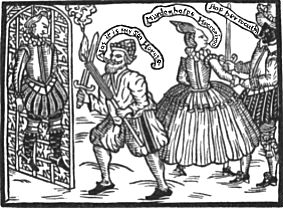Sound and sentences
The Elizabethans loved the sound of their language on stage. Even the most inept of early plays rhymed and alliterated (click for an example), and it was Marlowe's "mighty line*" rather than his sensational plots that made his plays so popular. There was an energetic debate about the appropriateness of English adopting more difficult words from other languages; Shakespeare himself used many unusual words, but at the same time he satirized the excessive use of elaborate language.
In grammar, the sound of the language was more important than the logic of the way a sentence was constructed. If it suited their purpose to invert natural word order or to repeat words for emphasis, writers would do so.
In Elizabethan grammar there were fewer transitional words and other grammatical signals, and so it is sometimes difficult to distinguish subordinate clauses from main clauses or subjects from objects, especially in verse, where the writer might shorten words or leave them out altogether* if the metre demanded it. (More about special Elizabethan words like "thou."*)
Superlatively dead
In Shakespeare's time the comparative adjective "more" and the superlative adjective "most" were used as intensifiers, as "very" would be today. As a result, the plays are full of what we would call double comparatives and double superlatives*. When Hamlet describes the deceased Polonius as "most still, most secret and most grave" (3.4.214), he is using this kind of expression, rather than describing Polonius as the most dead of all dead people.
A similar effect was achieved by doubling words so that the first use of the word intensified the second. Hamlet in particular contains several of these uses: "Excellent, excellent well" (2.2.173), "quite quite down" (3.1.154) and of course the opening of one of his most famous soliloquies, "O that this too too sullied* flesh would melt" (1.2.129).
Footnotes
-
Marlowe's "mighty line"
The phrase is from Ben Jonson's fine poem in praise of Shakespeare. Click for more.
-
Mincing words
When a messenger arrives from Rome in the middle of a romantic scene, Antony expresses his irritation briefly: "Grates me! The sum" (Antony and Cleopatra, 1.1.18)--in other words, "[It] grates [on] me! [Give me] the sum[mary].
-
Wherefore "thou"?
We tend to think of "thou" as simply being the antiquated version of "you," but Shakespeare used both forms: "thou" was used to denote either familiarity and affection, or (if used inappropriately) contempt, while "you" was used for strangers. (The distinction is preserved in other languages; compare the German "du" / "Sie" and the French "tu" / "vous.")
In Twelfth Night, Sir Toby suggests that Sir Andrew can insult Viola if "thou thou'st him some thrice" (2.2.41). In Hamlet, Marcellus observes that Horatio has somehow offended the ghost; it is possible that the offense comes from Horatio's use of "thou": "What art thou that usurp'st this time of night. . . By heaven I charge thee speak" (1.1.47-50).
(Incidentally, "wherefore" is used here and in Juliet's famous query in the sense "why," not "where.")
-
More fitter grammer
In the 18th Century, when grammar became more standardized, the double superlative was deemed illogical; in fact, Pope "corrected" many of Shakespeare's lines, changing Antony's "This was the most unkindest cut of all" (Julius Caesar 3.2.183) into "This, this was the unkindest cut" and Angelo's "To some more fitter place" (Measure For Measure 2.2.17) into "To some more fitting place."
-
Sullied. . .?
Or "solid." Read more about the possible meanings of this passage.
-
"Helpe helpe"
On the title page of Thomas Kyd's Spanish Tragedy the scroll (like a comic strip balloon) records the lines spoken by several characters in a scene where Hieronymo and Isabella discover their son murdered.
Hieronymo: Alas, it is my son Horatio.
Isabella: Murder, helpe, Hieronymo.
Lorenzo: Stop her mouth.
